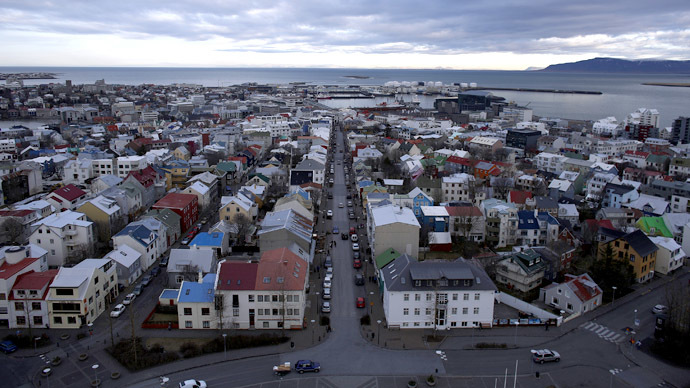FLASHBACK: REMEMBER THAT TIME THE BANKS IN ICELAND COLLAPSED AND MORTGAGES WERE ADJUSTED IN FAVOR OF PROPERTY OWNERS AND NOT THE BIG BANKS?
Strategic failure: Iceland allowed 2008 bank collapses to support h...

Iceland, whose stock market after the 2008 financial crisis plunged 90 percent while unemployment rose ninefold, has chosen a risky crisis-management policy as a way-out. After shrinking by over 10 percent during 2009-2010, Iceland's GDP began to recover.
During the worst financial crisis in six decades, successive Icelandic governments forced banks to write off mortgage debts to help households, and while the euro area struggles with record unemployment rate (with over 25 percent in Greece and Spain), Iceland has a reason to celebrate, with joblessness in December as low as 4.5 percent, according to Statistics Iceland. The number of persons in the labor force in the fourth quarter last year was 184,600, which corresponds to an activity rate of 80.7 percent.
The prime minister recently announced that the next big challenge for the small island nation with the population of 325,620 is to see unemployment going to under 2 percent, because, as Sigmundur D. Gunnlaugsson told Bloomberg in January, "Icelanders aren’t accustomed to unemployment.”
At 85 percent, Iceland's labor-market is the highest in Europe and one of the highest in the world. In December alone, 172 new private limited companies were registered in the island, compared with 147 in December 2012. The largest number of new registrations was in financial and insurance activities. In 2013, 1,938 new private limited companies were registered, which is a 10.6 percent increase compared with 2012.
On January 24, Standard & Poor's Ratings Services revised the outlook on Iceland to stable from negative. S&P estimated that Iceland's proposed mortgage debt relief program will have a cumulative fiscal cost of about 6 percent of GDP over the next four years. It is expected that the government will finance the program through increased taxation and not higher deficits. High external debt burdens remain key ratings constraints, however.
"Although Iceland's economy was able to adjust after the crisis through currency depreciation and private sector defaults, a nonresident holding of ISK-denominated assets presented a large overhang to the currency markets. The Central Bank of Iceland addressed this through foreign exchange controls implemented in 2008. Its plans to lift the controls have been hampered by the country's shallow domestic capital markets and the significant risks of capital flight," S&P said in a statement, adding that the need for continued foreign exchange controls is a credit weakness for the sovereign ratings on Iceland.
Iceland’s inflation has mostly come via the exchange rate protected by capital controls. Over the past 12 months, the krona has appreciated about 10 percent against the euro.
"Although we’re spending more on welfare matters today than before, we have to keep in mind that purchasing power has gone down since 2008," a sociology professor at the University of Iceland, Stefan Olafsson, told Bloomberg.
Despite overwhelming criticism from international financial institutions, Iceland’s government (formed after the April 2013 election) announced in November that it will be writing off up to 24,000 euro ($32,600) of every household’s mortgage, fulfilling its election promise. The government said the debt relief will be spread out over four years and will begin by mid-2014; and the prime minister has promised that public finances will not be put at risk.
According to estimates, the measure is set to cost $1.2 billion in total, reduced by 13 percent on average. The design of the measures could result in foreign creditors of the defaulted Icelandic banks bearing around three quarters of the cost of the household debt forgiveness, however. The International Monetary Fund (IMF) said Iceland has "little fiscal space for additional household debt relief," while the Organization for Economic Cooperation and Development (OECD) stated that the island should limit its mortgage relief to low-income households.
Iceland's financial sector has been restructured since the bank defaults of 2008. In what became the biggest penalty for a financial scandal in Iceland's history, four former bosses from the failed Kaupthing Bank were sentenced to between three and five years in prison in December, and must pay millions of pounds in legal costs. They were convicted of fraud ahead of the collapse of the country's biggest bank in October 2008. The bankers were accused of concealing an investor from Qatar, which bought a 5.1 percent equity stake in Kaupthing, with the money illegally provided as a loan from the bank itself.
In 2008, Kaupthing and other Icelandic banks, such as Landsbanki and Glitnir, were on the brink of collapse and had borrowed funds on the money markets to provide credit to customers. The amount borrowed was more than six times Iceland's gross domestic product. Kaupthing collapsed in 2008 under the weight of huge debts.
"Destroying the New World Order"
THANK YOU FOR SUPPORTING THE SITE!
Latest Activity
- Top News
- ·
- Everything
Ghislaine Maxwell & The Secret "Shadow" 9/11 Commission? | John Kiriakou
When the Communists Take Over America!...Famous 1957 Anti-Communist Movie
When the Communists Take Over America!...Famous 1957 Anti-Communist Movie
Are the End Times Drawing Near?
Catherine Fitts: Epstein, CIA Black Budget, the Control Grid, and the Banks’ Role in War
Ключові слова в тексті: як органічно їх вписати в статтю
Orwell - Football, Beer & Gambling
I, Pet Goat VI by - Seymour Studios | I, Pet Goat 6
© 2026 Created by truth.
Powered by
![]()

You need to be a member of 12160 Social Network to add comments!
Join 12160 Social Network